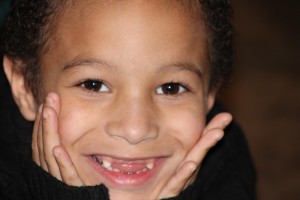Answered by Tanya L. DeSanto DDS
Question: “Why is my child grinding her teeth at bedtime? It sounds awful!”
Answer: “When you look in on your sleeping child, you want to hear the sounds of sweet dreams: easy breathing and perhaps an occasional sigh. But some parents hear the harsher sounds of gnashing and grinding teeth called bruxism, which can be common in children.
Bruxism is the medical term for the grinding of teeth or the clenching of the jaws, especially during sleep or while under stress. The American Academy of Pediatric Dentistry states that 3 out of every 10 children will grind or clench, with the highest incidence in children under the age of 5.
- Children may grind because the top and bottom teeth are not aligned correctly. Others do it as a response to pain, such as an earache or teething.
- Children might grind their teeth as a way to ease their pain, just as they might rub a sore muscle.
- Most kids outgrow these fairly common causes for grinding. Stress, usually nervous tension or anger, is another cause.
Generally mild bruxism doesn’t hurt a child’s teeth. Many cases go undetected, with no adverse effects, though some may result in mild morning headaches or earaches. In more advanced or extreme circumstances, nighttime grinding and clenching can wear down tooth enamel, chip teeth and increase temperature sensitivity, and cause severe facial pain and jaw problems, such as temporomandibular joint disease (TMJ). Most children who grind, however, do not have TMJ problems unless their grinding and clenching is chronic.
Some signs to watch for:
- grinding noises while your child is sleeping
- complaining of a sore jaw or face in the morning
- thumb sucking
- fingernail biting
- gnawing on pencils and toys
- chewing the inside of the cheek
Fortunately, most kids outgrow bruxism, but a combination of parental observation and dental visits keep the problem in check. Some dentists even recommend a night guard appliance. I feel this is very effective in adult grinding cases but not so much in children. A child’s mouth continually changes, so one appliance will never fit for very long. Kids are hardly ever compliant with appliances in their mouths and it gets to be quite costly with every new appliance made.
Whether the cause is physical or psychological, your child may be able to control the bruxism by relaxing before bedtime. Taking a warm bath or shower before bedtime, listening to calming music, or reading a book can help calm your child.
For bruxism that is caused by stress, you have to work with your child to find out what is really bothering them and find a way to help them through it. This is harder than it sounds. The issue can be very complicated if the stress is induced for reasons that cannot be changed, i.e. moving to a new town, the birth of a new sibling, etc. If a parent becomes alarmed by the child’s emotional state, it is time to get the pediatrician involved, as well.
The good news is that bruxism is usually outgrown by adolescence. Most children stop grinding when they lose all of their baby teeth because permanent teeth are much more sensitive to pain. A few children do continue to grind through adolescence. If this is the case, the dentist begins treatment to stop the grinding via a nightguard or tanner appliance. Be sure to consult your dentist and/or your pediatrician if you have additional questions
Submitted by Springfield Moms sponsor Tanya DeSanto, DDS. For more information on her practice, visit our Mom’s Choice Directory.










